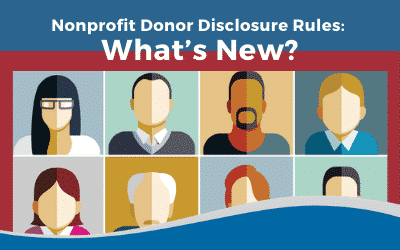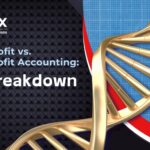Nonprofit Donor Disclosure Rules: What’s New
Have you heard the latest in donor disclosure news? Recently, the IRS and the Treasury Department issued final regulations that changed the requirements for many tax-exempt organizations. The new rule means that most 501(c) nonprofits no longer have to report their major donors’ names and addresses on their Schedule B (the Schedule of Contributors) on their Form 990 or 990-EZ. What does that mean? Let’s break it down…
First, some background
Up until 2018, every nonprofit organization had to file Schedule B and disclose the names and addresses of donors who gave $5,000 or more to their organization. In July 2018, the IRS issued Revenue Procedure 2018-38, which allowed certain types of nonprofits, including 501(c)(4) social welfare organizations and 501(c)(6) professional and trade associations, to no longer disclose those large donors. Exceptions were for 501(c)(3) charities and Section 527 political organizations. The procedure put the responsibility on the organizations, requiring them to maintain their donor’s details on their own. That way, they could disclose the information in the event of an audit or some other compliance requirement. Then, on July 30, 2019, in Bullock v. IRS, a federal district court in Montana ruled that the IRS’s Revenue Procedure 2018-38 unlawfully violated the Administrative Procedure Act (APA) because there was no public notice of the change.

Why did the IRS put the new rule in place?
Concerns arose regarding donor privacy as well as the possible inadvertent, and in some cases, intentional disclosures. Moreover, the IRS felt that collecting the names and addresses of contributors on Schedule B was not required to enforce federal tax law. This time around they ensured that there was formal public notice and comments available for the change.
Which organizations can and can’t take advantage of the new rules?
The groups that are no longer required to identify donors on their Schedule B are 501(c)(4), 501(c)(5), and 501(c)(6) organizations. However, the new disclosure rule does not cover 501(c)(3) charitable organizations or section 527 political organizations — each of which must continue to disclose the names and addresses of substantial donors on their annual information returns. Keep in mind that the final regulations only change what donor information is reported to the IRS, not what donor information is publicly available.
What do I have to report?
Even if your organization is exempt from reporting substantial contributors, you still need to maintain detailed financial records. Nothing has changed as far as annual reporting of financial contributions to the IRS on Form 990 and 990-EZ. Donor reporting at the state level varies from state-to-state.
What is the effective date?
The final regulations on IRS donor reporting requirements were effective as of May 28, 2020. Some organizations may opt to rely on the changes to the donor reporting requirements for their annual information returns filed after September 6, 2019.
What are my nonprofit’s reporting requirements?
If you need expert advice on how this new rule may affect your reporting, we can help. We’ve worked with hundreds of nonprofits and are always up to date on the latest federal and state reporting requirements. If you need a hand, then let’s talk today. You’ll be glad you did.
Non Profit Accounting Solutions
About Us
Qbix's goal is to provide the latest cloud-based accounting technology while delivering real-time visibility into your nonprofit's financials 24/7. Numbers are our passion, but providing your nonprofit with the financial expertise needed to facilitate growth and profitability is our top priority. And because no two organizations are the same, Qbix offers the flexibility you need to accomplish your nonprofit's goals.
Qbix
500A Northside Crossing
Macon, GA 31210
(478) 787-0532
Let Us Prepare Your Form 990
Save time, money, and stress. Let us prepare your Form 990. Schedule a consultation today.






